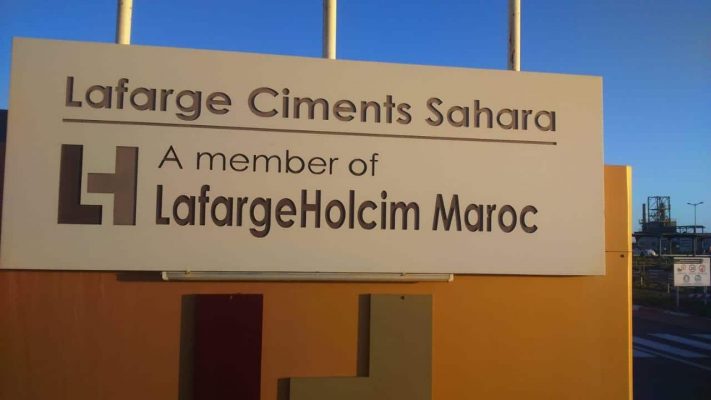LafargeHolcim - Infrastructure creates facts

In the past two years, LafargeHolcim Maroc commissioned a cement factory in the occupied Western Sahara and was involved in the construction of a port. In this way the Swiss company is supporting Morocco's exploitation of resources in violation of international law and is promoting the conflict over the last colony in Africa.
LafargeHolcim Maroc is half owned by the Swiss building materials manufacturer LafargeHolcim and Al Mada (formerly SNI) - a company owned by the Moroccan king. This joint company has been implementing several construction projects in the Moroccan-occupied Western Sahara since 2016. Although the Swiss parent company stresses that its business there is purely economic, it helps to cement the political status quo.
And this quite literally. With the cement produced in Western Sahara, the Moroccan state is building infrastructure for the economy, the military and settlers. The Group does not rule out the possibility that cement from LafargeHolcim will also be used.
Settlement policy, economic activities and the construction of infrastructure are hampering the peace process, which has been under UN leadership since 1991. One condition of the ceasefire negotiated at that time is the holding of a referendum on self-determination for the Sahrawis - a vote on the independence of Western Sahara. Both parties to the conflict agreed to this, Morocco and the Frente Polisario as recognised representatives of the Sahrauis.
No neutral projects
One of the main points of contention is who is considered Sahraui in the disputed area and is therefore entitled to vote. The development of the economy and infrastructure is attracting new Moroccan settlers. The conflict over the still pending referendum allows the conclusion that Morocco is thus deliberately driving a demographic change.
Thus, no project of a foreign company is a neutral project, but always a political project. The port in El Aaiun, in whose construction LafargeHolcim was involved, is also a political project. From this port, the state-owned Moroccan mining company OCP ships phosphate from the Phosboucraa mine near El Aaiun.
Morocco is thus violating international law, as Western Sahara is listed as a non-self-governed territory according to the UN. The population concerned must give their consent to the extraction of resources in this region and benefit from it. The Polisario Front has never consented to phosphate mining.
In 2017, a South African court confirmed that phosphate mining by Morocco is illegal. It confiscated a cargo ship from the Western Sahara and signed over the entire cargo of phosphate to the Polisario Front.
Switzerland follows UN definition
A court in this country would have to make the same ruling, because the Swiss Confederation follows the UN definition. From Switzerland's point of view, too, the Sahrauis thus have a right to their own resources. This makes the activities of the Swiss LafargeHolcim in the Western Sahara all the more shocking. With its port project, LafargeHolcim is promoting the illegal mining of phosphate and fuelling the conflict.
LafargeHolcim follows the common argument that the local population would benefit from factories and economic investment. However, here too the question arises as to which population is meant: the Moroccan or the Saharan? In fact, few Sahrawis are hired by Moroccan companies and the Sahrawis in the refugee camps in Algeria have nothing to gain.
The Sahrawis living in the occupied territory regularly protest against their socio-economic discrimination and explicitly reject economic activities by foreign companies. As long as the royal family benefits from economic activities in the occupied Western Sahara, it will have no interest in changing the situation.
Other Swiss companies are also active in Western Sahara.Hitachi Energy is involved in wind energy projects, Volg sells tomatoes from the occupied territory and Swiss companies are repeatedly involved in the transport of fish or phosphate from Western Sahara.

